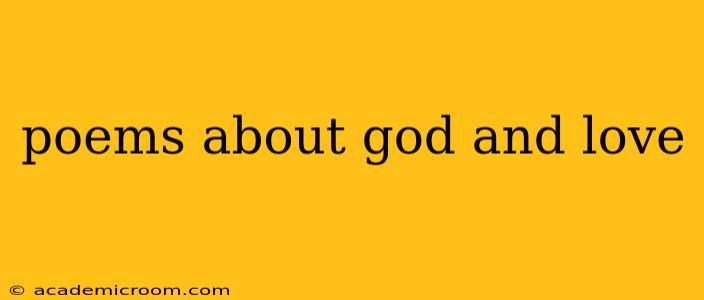The intersection of God and love has inspired countless poets and writers throughout history. This exploration delves into the multifaceted ways poets have expressed this profound connection, revealing the diverse perspectives and emotional depth inherent in the theme. Whether expressing ecstatic devotion, questioning faith, or finding solace in divine grace, poems about God and love offer a rich tapestry of human experience interwoven with spiritual yearning.
What are some examples of poems about God's love?
Many poems beautifully capture the essence of God's boundless love. Consider the passionate devotion found in the Psalms, particularly Psalm 23 ("The Lord is my shepherd"), which offers comfort and trust in God's guiding presence. The imagery of the shepherd caring for his flock provides a powerful metaphor for God's protective love. Similarly, the Song of Solomon, though often interpreted allegorically as representing the relationship between Christ and the Church, contains passionate imagery of love that can be viewed as reflecting God's passionate love for humanity. Modern poets like Mary Oliver often explore this theme, using nature's beauty to reflect God's creative love and the interconnectedness of all things.
How do poets express their love for God?
Poets employ various techniques to express their love for God, mirroring the multifaceted nature of this emotion. Some utilize fervent praise and adoration, as seen in hymns and liturgical poetry. Others express their love through acts of service and commitment to God's will. Confessional poetry often explores the complexities of faith, doubt, and the ongoing struggle to reconcile personal experience with divine love. Metaphors and similes are frequently employed, drawing parallels between earthly love and the divine, such as comparing God's love to a boundless ocean, a sheltering mountain, or a comforting fire. Imagery from nature often features prominently, reflecting God's creation and the awe-inspiring beauty of the natural world.
What are some poems that explore the relationship between God and romantic love?
Many poems explore the intricate relationship between God's love and human romantic love. Some poets see romantic love as a reflection of God's love, a glimpse into the divine mystery of connection and intimacy. The passionate intensity of romantic love can mirror the devotional fervor expressed in religious poetry. However, other poets might explore the tension between earthly desires and spiritual yearning, examining the challenges of balancing romantic love with devotion to God. The imagery of a love that transcends earthly limitations, reflecting the eternal and unconditional nature of God's love, often emerges as a central theme.
How does the concept of divine love differ from human love?
While both divine and human love involve deep affection and connection, they differ significantly in their scope and nature. Divine love is often characterized as unconditional, boundless, and eternal, extending to all creation without judgment or limitation. Human love, while deeply meaningful, is often conditional, finite, and prone to change. Human love can be selfish or self-serving at times, whereas divine love is selfless and sacrificial. Exploring these contrasts highlights the unique and transcendent quality of God's love as compared to the experiences and limitations of human love.
How can poetry help us understand the concept of God's love?
Poetry, with its evocative language and imagery, offers a unique avenue for exploring and understanding the concept of God's love. It allows for the expression of profound emotions and spiritual experiences that may be difficult to articulate in prose. By immersing ourselves in the poetic expressions of faith, doubt, and love, we can gain a deeper appreciation for the multifaceted nature of our relationship with the divine. Poetry can also help us connect with our own spiritual experiences, fostering empathy and understanding of others' journeys of faith. Through the art of poetry, the abstract concept of God's love becomes more tangible, relatable, and deeply resonant.
This exploration into poems about God and love aims to demonstrate the rich diversity of poetic expressions addressing this timeless theme. By understanding the different approaches and perspectives presented throughout poetic history, we can gain a deeper appreciation for the profound and complex relationship between humanity, faith, and divine love.
